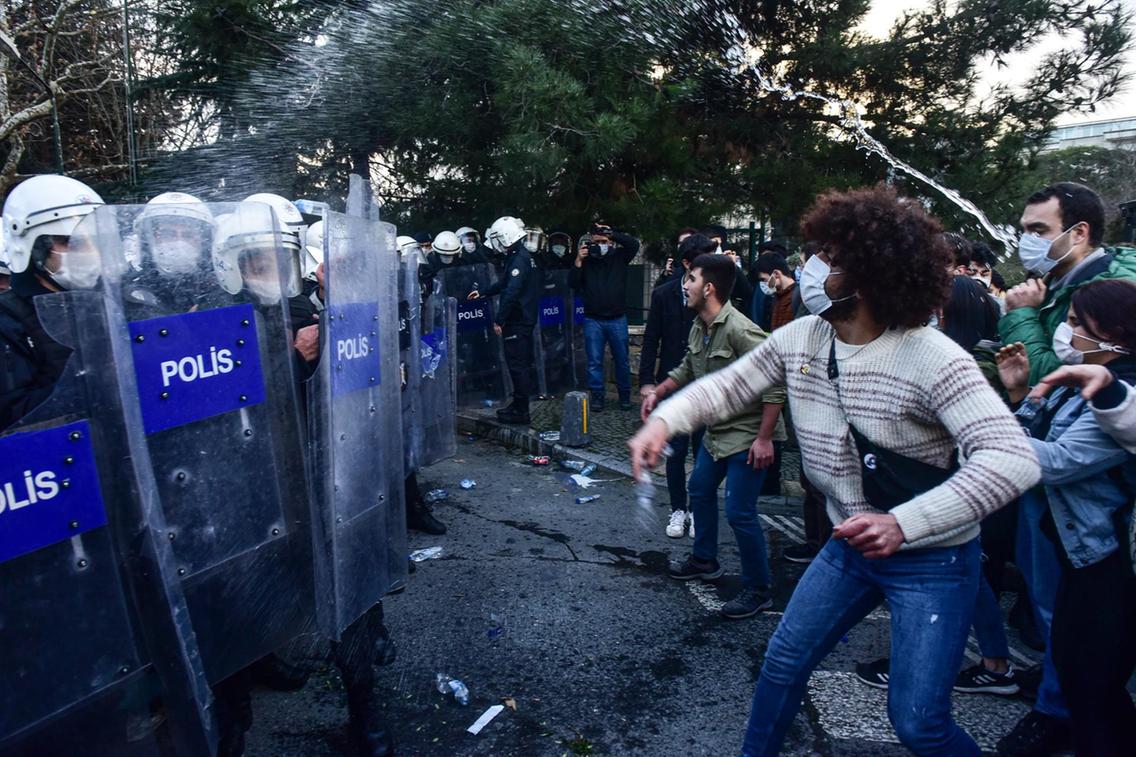U,S. President Joe Biden’s administration has had its first encounter with Turkey’s increasingly authoritarian government – only two weeks after taking office.
On Monday, Turkish police descended on the campus of Boğaziçi University in Istanbul, tearing through encampments erected by students protesting the appointment of a pro-government rector to head the prestigious academic institution. According to the Istanbul Governor’s office, 159 students were arrested on that day alone, while another 104 were detained on Tuesday.
The protests are now in their fourth week and neither the students nor the government appear ready to back down. There are some echoes of previous protests against the government of Turkish President Recep Tayyip Erdoğan, most notably the 2013 Gezi Park protests that signified for many the accelerating of the country’s democratic decline.
Erdoğan himself referenced Gezi on Wednesday, condemning the students as “terrorists” and telling members of his Justice and Development Party (AKP) that Turkey “will not again live a Gezi event in Taksim”.
While not as large as the 2013 demonstrations, those at Bogazici do bear striking similarities, explained Merve Tahiroglu, Turkey program coordinator at the Project on Middle East Democracy in Washington.
“To a lot of us, it reminds us of the Gezi protests,” Tahiroglu told Ahval in a recent podcast. To her, the most striking similarity is the manner in which the demonstrations have expanded from a single-issue protest to expressing wider frustration with the current regime.
She highlighted the heavy-handed response of the government, which did more to add to the grievances than quell them.
The Gezi protests began as a small demonstration against the government’s plan to remove one of Istanbul’s only remaining green spaces but evolved into a public rebuke of Erdoğan’s entire system
At Boğaziçi, students and faculty initially opposed Erdoğan’s appointment of a new rector as an infringement on academic freedom, but this has evolved to include resistance against police brutality and hate speech from state officials, most notably against LGBTQ students.
Erdoğan previously said “there is no such thing” as LGBTQ in Turkey and Interior Minister Süleyman Soylu recently described the protestors as “deviants”, prompting Twitter to mark the posts as “hateful content”. In response, Soylu claimed LGBTQ was invented by the West and that Twitter’s earlier actions were the result of “pressure from the gay lobby”.
The U.S. State Department expressed its concerns about the Turkish government’s reaction, saying the U.S. “firmly opposes abuses against LGBTQI+ persons”, the first remarks from the Biden administration. State Department Spokesperson Ned Price later added the U.S “strongly condemn(s) the anti-LGBTQI rhetoric surrounding the demonstrations”, a veiled jab at Soylu and similar statements from other Turkish officials.
Tahiroglu described the U.S. response as “really encouraging for all of us who want to see a more democratic and pro-human rights Turkey”, comparing it favourably to the silence on Erdoğan’s authoritarianism under former U.S. President Donald Trump.
“The Trump administration completely ignored Erdoğan’s power grabs and transgressions,” said Tahiroglu, adding this had encouraged Ankara. “Trump was the type of leader who respected other strongmen and Erdoğan is the ultimate strongman.”
Despite public statements expressing a willingness to work together, many observers highlighted the trepidation in Ankara since Biden’s victory over Trump in November. And as Tahiroglu noted, human rights have already proven a prickly topic.
On Tuesday, Biden’s National Security Advisor Jake Sullivan spoke by phone with Erdoğan’s senior foreign policy aide İbrahim Kalın about a range of shared issues. In the White House readout of the call, Sullivan “underscored the Biden administration’s commitment to supporting democratic institutions and the rule of law”. There was no similar reference in the Turkish presidency’s readout.
Following the State Department’s remarks on the Boğaziçi protests, the Turkish foreign ministry released a statement criticising “certain circles abroad”.
“We recommend to those who turn a blind eye to Turkey’s lawful acts regarding events taking place at Boğaziçi University and who intend to lecture Turkey on democracy and law look in the mirror,” it read.
Tahiroglu called this statement a “strange attempt at moral equivalence” that has been common throughout Erdoğan’s tenure. To allude to the serious abuses during the Trump era, such as the militant response to Black Lives Matters protests, and the assault on the U.S. Capitol on Jan. 6, was a false equivalence, she said.
“For Turkey to now say the Biden administration is one of the representatives of intolerance towards public expressions of dissent is just a ridiculous response,” Tahiroglu said.
Regardless of any need to renew U.S. democracy at home, or the growing calls in Washington to downgrade U.S.-Turkey relations to transactional terms, she insisted it remains important for Biden to speak out against Turkey’s democratic backsliding.
“I think it is very important for the United States to place premium importance on this topic,” Tahiroglu said. “It takes more than just a one-line statement at the end of a readout or a few statements by the State Department. They need to do more and raise these issues at the highest levels with Turkey.”







































admin in: How the Muslim Brotherhood betrayed Saudi Arabia?
Great article with insight ...
https://www.viagrapascherfr.com/achat-sildenafil-pfizer-tarif/ in: Cross-region cooperation between anti-terrorism agencies needed
Hello there, just became aware of your blog through Google, and found ...